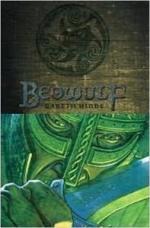|
This section contains 2,241 words (approx. 8 pages at 300 words per page) |

|
Beowulf as a Pagan Oral Tradition
Summary: The epic poem "Beowulf" uses oral tradition to tell the story about Germanic historical triumphs and adventures. The story is tied to pagan beliefs, although Christian elements were later added. It is obvious that more than one writer contributed to the poem.
The unknown author of Beowulf uses examples throughout the poem that suggest the story comes from an "oral" tradition. In the poem Beowulf, a Germanic scop, or bard, recites poetry orally, or in a song, usually telling stories about historical triumphs and adventures. These poets were referred to in this epic poem as "carriers of tales..., traditional singer[s] deeply schooled in the lore[s] of the past" (Beowulf 50). This was common in Germanic culture. Scops would keep folkloric heroes alive in the "oral" tradition. They passed down stories orally from one generation to the next.
"The Beowulf poet himself imagines such oral performances by having King Hrothgar's court poet recite a heroic lay at a feast celebrating Beowulf's defeat of Grendel" (Beowulf 29). "[A] thane of the king's household...linked a new theme to a strict meter. The man started to recite with skill, rehearsing Beowulf's triumphs and...
|
This section contains 2,241 words (approx. 8 pages at 300 words per page) |

|


